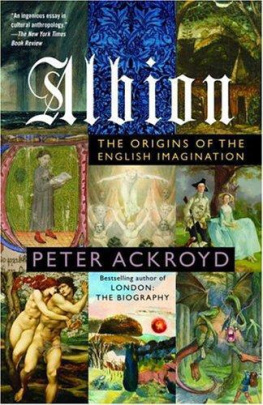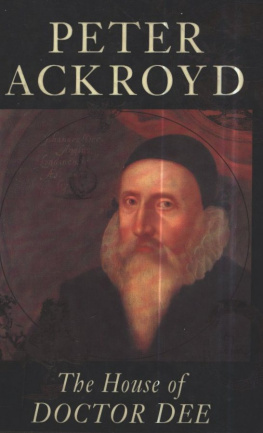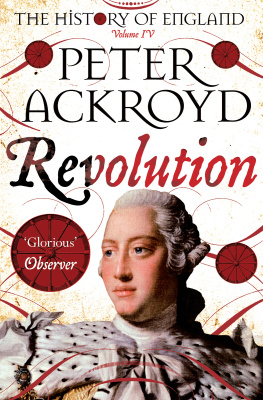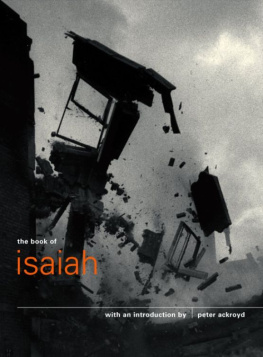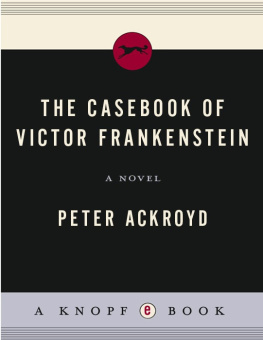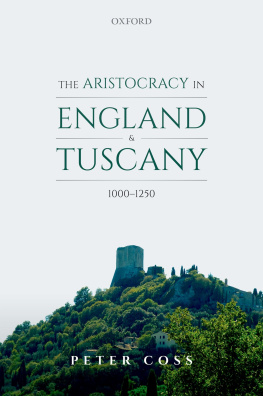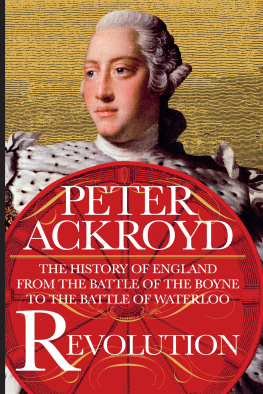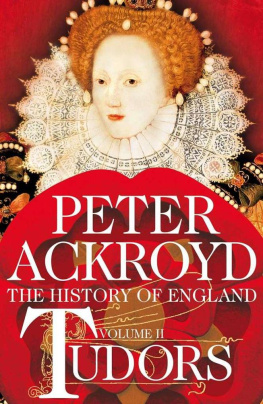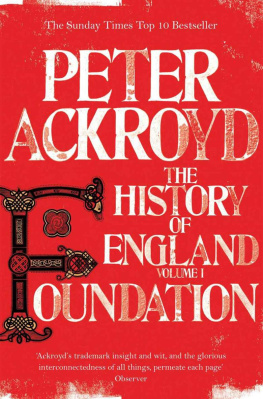Contents
Guide
Peter Ackroyd
THE HISTORY OF ENGLAND
VOLUME VI
INNOVATION

The author and publisher have provided this e-book to you for your personal use only. You may not make this e-book publicly available in any way. Copyright infringement is against the law. If you believe the copy of this e-book you are reading infringes on the authors copyright, please notify the publisher at: http://us.macmillanusa.com/piracy.

The greatest shock of the Second Boer War was not the protracted and bloody guerrilla warfare, but the wretched condition of the British troops. The conscripts were malnourished and sickly, their morale low. After the war was over in 1902, an inquiry revealed that 16,000 servicemen had died of disease, due to poor rations and constitutional weakness. Many of the English soldiers had been press-ganged by penury, but around 60 per cent of the volunteers had been rejected as unfit for service. This finding prompted further investigations into the deterioration of certain classes of the population, though they came at least fifty years too late.
Investigations into the military conduct of the war were equally disturbing. It had taken almost half a million British troops to subdue a Boer population similar to that of Brighton, at a cost of 250 million. The publication of these inquiries prompted the government to create a Committee of Imperial Defence to coordinate the armed forces, and stemmed the tide of English jingoism. In 1900, during the triumphant opening phase of the war, a wave of imperialist enthusiasm had carried the Conservative and Liberal Unionist coalition to power at the so-called khaki election. The Tory-dominated coalition secured a large majority over the Liberals, defying the swing of the pendulum law of British politics.
As the war continued, those who had previously felt imperial pride expressed disappointment and shame. The working classes even declared their admiration for the Boer rebels. Whats the good of talking about the Empire on which the sun never sets, one Londoner put it, when the sun never rises on our court? By the end of the decade, patriotic platitudes concerning the Great Empire provoked laughter.
Were the British armys deficiencies symptomatic of a wider national degeneration? In the nineteenth century, many people had believed that English enterprise and integrity had helped to bring order to the distant territories and diverse cultures of the British Empire; at the beginning of the new century, they no longer believed these boasts. After the Boer War, it was customary for politicians to speak of the consolidation or integration of existing colonies, dominions and spheres of economic influence. It was thought that strengthening political and economic ties within the empire was crucial if England were to survive as a great power, at a time when Germany, Japan and the United States of America were flourishing.
Some politicians argued that the creation of a system of self-governing dominions within the empire was the only way to secure unity, given the limited capacity of British troops and increasing nationalist sentiment in territories under British control. In the late nineteenth century, Indias educated elite had developed political theories based on the principle of representative national institutions. In Ireland, popular support for Home Rule had been paramount for decades, and anti-English sentiment became more intense.
Similar criticism could be heard in England. The burning of thousands of Boer homes and farms by British troops, and the construction of 8,000 concentration camps to house the evicted Boers, provoked outrage, and when around 20,000 women and children died in the camps, the anger grew. Then news reached England that the government had allowed 50,000 Chinese labourers to work in South African mines for paltry wages and in appalling living conditions. On the opposition benches, Liberal politicians took up the cry of Chinese slavery. Imperial expansion had been justified by the argument that Britain was bestowing civilization on primitive societies. At the end of the nineteenth century, the English viceroy of India had boasted of importing the rule of justice to the country, along with peace and order and good government. But in the wake of the Boer War, many observers regarded Britains civilizing mission as an excuse for exploitation.
After 1900, the English were also forced to confront their economys diminishing international status. In the Victorian era, English manufacturers had dominated world trade. A combination of technological innovation and cheap labour had allowed goods to be produced inexpensively in England; the availability and expansion of imperial markets, as well as mastery of the seas, had ensured they could be safely sold around the world. Meanwhile, Britains colonies had commissioned elaborate engineering projects from English firms, with money borrowed from the City of London. The United Kingdom had been responsible for a third of the worlds manufacturing in the 1870s, but in the early 1900s this figure fell to 10 per cent.
England could no longer claim to be the workshop of the world that title was now contested by Germany and the United States, which had been strengthened by unification in the second half of the nineteenth century and had developed modern production methods during recent wars. By 1900 the United States produced more coal and iron than England, while Germanys mining technology, electrical engineering and chemical industries were superior. Part of Englands problem was that it had industrialized long before its rivals, and neither the government nor the representatives of capital and labour had the vision or the will to reinvigorate the manufacturing sector. England was technologically sclerotic, unable to add to its imperial territories and shut out from many international markets by the tariffs of foreign governments. Her staple export industries of iron, wool, shipbuilding and coal had entered their senescence. To compound the problem of declining exports, England was increasingly dependent on foreign imports. After 1900 there was a balance-of-payments deficit, with more money leaving the country than coming in. Over the next fourteen years, economic growth halved.
At the beginning of 1901, The Annual Register described the outlook for England as full of misgivings. A few weeks later, on 22 January, the nations anxiety was compounded when Queen Victoria died. As the news spread across the country, church bells tolled, theatrical performances were abandoned and traffic halted, as people poured onto the streets. For many, despair was coupled with bewilderment. It is sometimes said by foreign observers that monarchism is the religion of the English, yet by no means everyone in the country was a believer: the novelist Arnold Bennett thought that Londoners were not, on the whole, deeply moved, whatever journalists may say.
All the commentators agreed, however, that the queens death marked a transition in the countrys history. We are less secure of our position, announced The Times. Our impetus as a nation may be spent. Soon after Victorias death, the passing of the ethos of Victorianism was also predicted. In his parliamentary address, the Tory leader of the Commons, Arthur James Balfour, announced the end of a great epoch.


